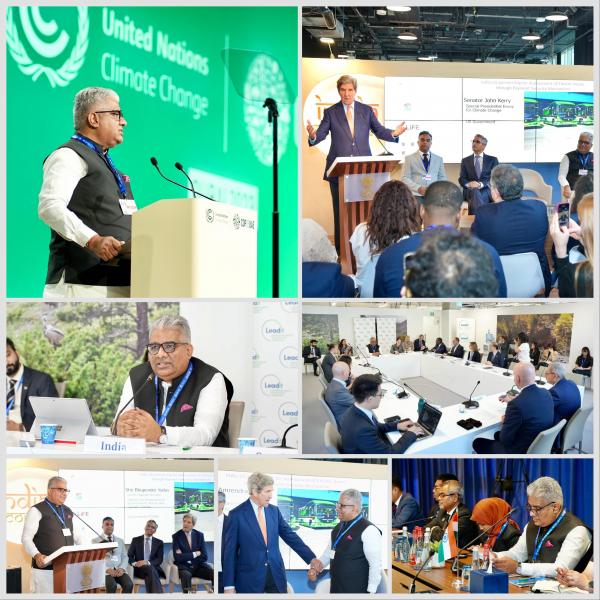
COP28 Diary: India shares its Third National Communication, talks about equity and climate justice in climate action
09/12/2023
BLOG
Negotiations and deliberations at the 28th Conference of Parties of the UNFCCC have gathered steam here in Dubai, UAE.
I presented the National Statement of India at the forum today, and began by congratulating the COP28 Presidency for steering this COP as the “COP for Action”, which, I mentioned, became evident on the very first day with the successful operationalization of the Loss and Damage Fund.
Under Hon’ble Prime Minister Shri Narendra Modi, India has been at the forefront of supporting action-oriented steps at the global level in response to climate change. We have always held the view that people and planet are inseparable and human well-being and Nature are intrinsically linked. I reiterated that it is India’s endeavour to decouple economic growth from greenhouse gas emissions, India has successfully reduced the emission intensity vis-à-vis its GDP by 33% between 2005 and 2019, thus achieving the initial NDC target for 2030, 11 years ahead of the scheduled time.
In addition to its domestic initiatives, India’s contribution to climate action has been significant through its international efforts such as International Solar Alliance (ISA), Coalition for Disaster Resilient Infrastructure (CDRI), creation of LeadIT, Infrastructure for Resilient Island States (IRIS) and the Big Cat Alliance and the Green Credit Initiative.
I emphasised that at COP28, India looks India forward to the Global Stock-take’s outcomes and hopes that they will provide meaningful and relevant inputs for deciding on enhanced climate action. I also stated that India firmly believes that equity and climate justice must be the basis of global climate action. This can be ensured only when the developed countries take the lead in ambitious climate action.
I requested country representatives to reaffirm their commitment to work together for the common objective for greener, cleaner and healthier planet as we have one Earth, we are One family and share One future.
***
At COP28 today, I co-hosted the LeadIT Summit 2023 with Swedish Minister Ms Romina Pourmokhtari.
Four years ago in 2019, LeadIT was launched by India and Sweden to enhance climate action and to support the implementation of Nationally Determined Contribution (NDC) in the countries, particularly in industrial sectors that are considered hard to abate.
The end of 2023 marks the beginning of LeadIT 2.0, launched by PM Modi and Swedish PM Mr Ulf Kristersson.
I stated that as we look back on the progress made since LeadIT's inception in 2019, we can take pride in our collective action and achievements. The platform has emerged as a beacon of leadership, bringing together industry pioneers, experts, and stakeholders to foster collaboration and drive meaningful change.
LeadIT has been able to raise the profile of industry transition on the international agenda through annual Summits and efforts of the members at multilateral platforms. It fostered partnerships to identify and address transition challenges. One of the focus areas was support on roadmaps for industry transition of the hard-to-abate sectors. At the same time, it promoted knowledge sharing on ways to accelerate industry transition.
Even as we took forward the day’s work, I was delighted to note that India has been placed 7th in this year's Climate Change Performance Index (CCPI). The country improved one rank from the previous one, and also remained among the highest performers. India maintained its top 10 position for the fifth year in a row.
The improvement is a result of the ‘economy with ecology’ development model put into action by Hon’ble PM Modi. The CCPI report said, “While India is the world’s most populous country, it has relatively low per capita emissions.”
On the sidelines of COP, I also met UNFCCC Executive Secretary Mr Simon Stiell, Japanese Environment Minister Mr Shintaro Ito, Secretary, Department of Environment and Natural Resources, Philippines, Ms Maria Antonia Yulo Loyzaga, and Saudi leader H.E. Abdulaziz bin Salman Al Saud. We discussed ways to further cooperation and deepen out ties in knowledge sharing for concerted climate action.
***
I also participated in the Mangrove Alliance for Climate Ministerial Meeting at COP28 Summit today.
Addressing the event, I stated that working under the leadership of Hon’ble PM Modi, India has adopted a holistic approach towards conservation. India is not just focused on reducing emissions to tackle temperature rise, but is also working towards arresting land degradation, accelerating ecosystem restoration and enriching biodiversity.
The value of biodiversity to humankind also lies in its economic dimension alongside the cultural and social aspects.
As part of this effort, in Budget 2023-24, the Indian government, building on India’s success in afforestation, rolled out the Mangrove Initiative for Shoreline Habitats and Tangible Incomes or, MISHTI. Under this scheme, mangrove plantations along the coastline and on salt pans are being taken up.
I shared that as India’s Environment Minister, I have myself been participating in events across India’s tidal regions such as the coastal areas of Gujarat and Tamil Nadu where mangrove plantation drives are being organised. I expressed pride in sharing that people are turning out in overwhelming numbers to plant mangroves. This environmentally conscious behaviour presents an example of deep ecology in practice where we are realising the inherent worth of all living beings regardless of their instrumental utility to human needs.
I humbly put forth the belief that the world has much to gain from India’s experience in mangrove conservation because we have shown expertise in the area for nearly five decades. India has restored different types of mangrove ecosystems.
***
In another significant development, India has shared Her Third National Communication based on GHG inventory of 2019 along with Initial Adaptation Communication to the United Nations. The Communication outlines the endeavour to decouple economic growth from greenhouse gas emissions. India has successfully reduced the emission intensity vis-à-vis its GDP by 33% between 2005 and 2019, thus achieving the initial NDC target for 2030, 11 years ahead of the scheduled time.
India has also achieved 40% of electric installed capacity through non fossil fuel sources, nine years ahead of the target for 2030. Between 2017 and 2023, India has added around 100 GW of installed electric capacity, of which around 80% is attributed to non-fossil fuel-based resources.
We have therefore revised our NDCs upwards indicating our deep commitment towards enhanced climate action.
***
On the sidelines of COP28, I also addressed ‘India-US Payment Security Mechanism (PSM)” for e buses in India’ along with United States Special Presidential Envoy for Climate Mr John Kerry.
Speaking at the event, I said that decarbonization of transport sector is essential to reduce the Greenhouse Gas (GHG) emissions and to meet the ambitious target of achieving net-zero emissions by 2070 set by Government of India GoI).
The adoption of electric vehicles (EVs) plays a crucial role in achieving the goal of net zero emissions. Given that buses serve the mass public, prioritizing electric buses is essential as a significant mode for decarbonizing the transport sector.
Transitioning to e-buses, however, poses challenges to Public Transport Authorities (PTAs) owing to their high upfront costs and lower realization of revenue from operations. Therefore, the India-US Payment Security Mechanism (PSM) for e-buses will serve as an incentive for both Indian and international OEMs/Bus operators to participate in e-bus operations and potentially establish a manufacturing hub in India, contributing to the growth of e-bus industry and e-bus exports.
During the recent visit of Hon’ble PM Modi to the US, the India-US Government (USG) Joint Statement to develop a “Payment Security Mechanism (PSM)” was released, so as to facilitate the deployment of 10,000 made-in-India electric buses. The same was reaffirmed during India's G20 Presidency, underscoring the importance of reducing carbon emissions in the transport sector.
I expressed hope that this initiative will popularize e-buses by encouraging private sector participation in the procurement and operation of these vehicles for an extended period of 10 to 12 years, fostering their adoption throughout India.
I wrapped my day with a dinner hosted by the COP Presidency which offered a platform for freewheeling discussions with leaders from world over. And also hosted a dinner for the Indian delegation at COP28.
Over to tomorrow.
